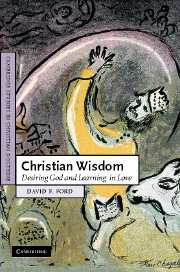Book contents
- Frontmatter
- Contents
- Acknowledgements
- Introduction: theology as wisdom
- 1 Wisdom cries
- 2 A wisdom interpretation of scripture
- 3 Job!
- 4 Job and post-Holocaust wisdom
- 5 Jesus, the Spirit and desire: wisdom christology
- 6 Learning to live in the Spirit: tradition and worship
- 7 Loving the God of wisdom
- 8 An inter-faith wisdom: scriptural reasoning between Jews, Christians and Muslims
- 9 An interdisciplinary wisdom: knowledge, formation and collegiality in the negotiable university
- 10 An interpersonal wisdom: L'Arche, learning disability and the Gospel of John
- Conclusion: love's wisdom
- Index of citations
- Subject index
2 - A wisdom interpretation of scripture
Published online by Cambridge University Press: 22 September 2009
- Frontmatter
- Contents
- Acknowledgements
- Introduction: theology as wisdom
- 1 Wisdom cries
- 2 A wisdom interpretation of scripture
- 3 Job!
- 4 Job and post-Holocaust wisdom
- 5 Jesus, the Spirit and desire: wisdom christology
- 6 Learning to live in the Spirit: tradition and worship
- 7 Loving the God of wisdom
- 8 An inter-faith wisdom: scriptural reasoning between Jews, Christians and Muslims
- 9 An interdisciplinary wisdom: knowledge, formation and collegiality in the negotiable university
- 10 An interpersonal wisdom: L'Arche, learning disability and the Gospel of John
- Conclusion: love's wisdom
- Index of citations
- Subject index
Summary
Christian theology requires an engagement with scripture whose primary desire is for the wisdom of God in life now. Interpretation with that desire is what is called here a wisdom interpretation of scripture. It tries to do justice to the various dimensions and senses of scripture; to the disciplines and methods through which it has been studied; to the interpretative traditions and communities engaged with it in the past and the present (Christian, cultural and artistic, political, scholarly, inter-faith, critical/polemical, and so on); to the virtues and practices that help wise interpretation; and to the interplay between conversations around the text and other conversations – for example, around God, worship, community formation, historical events and developments, ethical issues, service to society, spiritual and academic disciplines, religious and secular worldviews, or the shaping and healing of lives.
Any one of those topics could be the subject of more than one book. This chapter is an attempt to do just two things: to sketch in broad strokes what a wisdom interpretation of scripture is, using exegeses of biblical passages and analyses of exemplary wisdom interpreters, and distilling the maxims that guide such interpretation; and, in addition, to explain and support the ways in which scripture enters into the other chapters of this book.
The desirability of this task can be seen from various angles. Within Christian theology, biblical interpretation has always been of vital importance.
- Type
- Chapter
- Information
- Christian WisdomDesiring God and Learning in Love, pp. 52 - 89Publisher: Cambridge University PressPrint publication year: 2007



